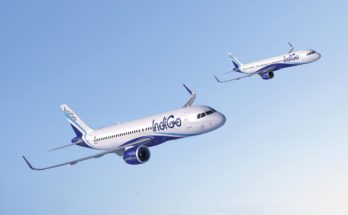Airbus Celebrates Strong Year as 737 MAX Weighs Heavily on Boeing’s Performance
by J. Kasper Oestergaard, European Correspondent, Forecast International.

Boeing and Airbus delivered 35 and 138 commercial jets in December 2019, compared to 102 and 127 deliveries, respectively, in the same month last year. Boeing’s deliveries took a severe hit in 2019 following two 737 MAX crashes and the subsequent deliveries halt and grounding of the fleet. Boeing decided last March to suspend all deliveries of 737 MAX jets. The crashes were caused by the aircraft’s Maneuvering Characteristics Augmentation System (MCAS), which suddenly activated in response to erroneous angle of attack information. For the full year 2019, Boeing delivered 380 aircraft, while Airbus set a new all-time annual record, handing over 863 jets. Boeing had retained a deliveries lead over Airbus since 2012. Airbus did, however, come in slightly below its full-year target, announced in February 2019, of 880 to 890 commercial aircraft deliveries. Boeing had originally set a target of 810-815 deliveries for 2019. In 2018, Boeing delivered 806 jets (763 in 2017), with Airbus handing over 800 (718 in 2017).
In December, Boeing delivered six 737NGs. On December 16, Boeing announced its decision to temporarily suspend 737 production from January 2020. Prior to this, Boeing had been producing 737 MAX jets at a reduced rate of 42 aircraft per month and thereby built up an inventory of aircraft ready to be shipped. Producing the 737 MAX at a reduced rate allowed the company to prioritize additional resources to focus on returning the 737 MAX to flight. However, with approximately 400 aircraft now in storage and no return-to-service date set, the company made the call to stop building more inventory, thereby preserving cash. Boeing announced that affected employees will continue 737-related work or be temporarily assigned to other programs. In the meantime, test flights and software changes continue. Boeing has carried out more than 900 test flights with new MCAS software, for a total of 1,700 flight hours. On January 10, the U.S. Federal Aviation Administration announced that it remains focused on following a thorough process for returning the 737 MAX to service. The FAA continues to work with other international aviation safety regulators to review the proposed changes to the aircraft. The FAA made it clear that its first priority is safety and that no timeframe for when the work will be completed has been set.
Also on January 10, Spirit AeroSystems, the world’s largest aerostructures manufacturer, announced that it will lay off 2,800 employees at its Wichita, Kansas, facility because of the 737 MAX production suspension and ongoing uncertainty. Spirit AeroSystems is a major supplier on the 737 MAX program, accounting for 70 percent of the airplane’s structure, including the entire fuselage and the thrust reversers, engine pylons, and wing components. The 737 MAX represents more than 50 percent of the company’s annual revenue.
“Our goal is to support Boeing and a safe return to service of the MAX,” said Tom Gentile, Spirit AeroSystems president and CEO. “We continue to work with Boeing to develop a new production schedule for 2020 with an eye toward minimizing disruption, maintaining the stability of our production capabilities, and best positioning Spirit for the future. When production levels increase sufficiently in the future, we look forward to recalling employees impacted by today’s announcement.”
To date, in total, Boeing has delivered 387 737 MAX jets, of which 256 were delivered in 2018, up from 74 in 2017. In December, Boeing also delivered three 767s, five 777s, and 21 787s – a new monthly Dreamliner production record. Boeing recently raised the monthly Dreamliner production rate to 14 aircraft and handed over 158 787s in 2019 in total – a new annual record. The company delivered 145 787s in 2018, up from 136 in 2017.
In December, Airbus delivered seven A220s, 105 A320s (3 CEO / 102 NEO – a new company record), eight A330s, 16 A350s (a new company record), and two A380s. Airbus recently increased the official A320 production rate to 60 aircraft per month and is targeting an additional raise to 63 jets per month from 2021. For the full year 2019, Airbus handed over 642 A320 family aircraft, of which 551 were A320neos. This compares to a total of 386 A320neo family aircraft delivered in 2018, up from 181 and 68 in 2017 and 2016, respectively. In October 2019, Airbus marked its 1,000th A320neo family aircraft delivery. Airbus delivered a record 112 A350s in 2019, up from 93 and 78 in 2018 and 2017, respectively. Airbus recently increased the monthly A350 production rate to 10. Airbus is considering a further increase to 13 A350s per month, but a date has yet to be announced.
Turning to the orders race, Boeing had a very quiet month, booking just three gross orders but also receiving six cancellations, resulting in minus three net new orders. Orders were for a 737 MAX and two 787 Dreamliners. For the full year 2019, Boeing accumulated 243 gross orders (330 cancellations => -87 net new orders). For the full year 2018, Boeing booked 893 net new orders (1,008 gross orders).

In December, Airbus had another strong month and booked 191 gross orders but also received 141 cancellations, for a net of 50. The largest December bookings were an Air France order for 60 A220-300s, a United Airlines A321neo order for 50 A321XLRs, and an order from an undisclosed customer for 40 A330-900 widebody jets. For the full year 2019, Airbus landed 1,131 gross orders (363 cancellations => net of 768), thereby retaking the orders crown from Boeing. Of the 363 cancellations, 31 were due to Emirates’ decision to reduce its A380 order book. This subsequently forced Airbus to announce that it will cease A380 production in 2021. In November 2019, Emirates decided to cancel an additional 39 A380 orders, reducing Airbus’ total A380 backlog to just 11 aircraft. In 2018, Airbus booked a total of 747 net new orders (831 gross orders), thereby losing the 2018 orders race as Boeing had accumulated 893 net new orders. Airbus had retained an orders lead over its rival every year since 2012.
At year-end 2019, Airbus’ backlog was 7,482 jets, of which 6,563, or 88 percent, were A220 and A320ceo/neo family narrowbodies. The company’s all-time backlog record high of 7,577 jets was set in December 2018. By the end of December 2019, Boeing’s backlog (total unfilled orders before ASC 606 adjustment) was 5,625 aircraft, of which 4,585, or 82 percent, were 737 NG/MAX narrowbody jets. Boeing’s all-time backlog high of 5,964 aircraft was set in August 2018. The number of Airbus aircraft to be built and delivered represents 9.4 years of shipments at the 2018 production level. In comparison, Boeing’s backlog would “only” last 7.0 years. For the full year 2019, Boeing’s book-to-bill ratio, calculated as net new orders divided by deliveries, is negative, as cancellations outpaced orders. Airbus’ book-to-bill ratio is 0.89. In 2018, Boeing boasted a book-to-bill ratio of 1.11, with Airbus at 0.93.
2020 Forecast
Forecast International’s Platinum Forecast System® is a breakthrough in forecasting technology. Among many other features, Platinum provides 15-year production forecasts. The author has used the Platinum Forecast System to retrieve the latest delivery forecasts and, for 2020, Forecast International’s analysts expect Boeing and Airbus to deliver 585 and 931 large commercial jets, respectively. Boeing’s 2020 total is very difficult to forecast given the 737 MAX uncertainty, and it may be revised significantly during 2020.
On January 29, in connection with the release of its 2019 earnings report, we can expect Boeing to provide some form of guidance for 2020. However, the 737 MAX uncertainty means that management will likely be cautious and avoid providing an aircraft delivery target for the year. On February 13, Airbus will report 2019 earnings and provide a target for 2020 commercial aircraft deliveries.




Note: Boeing 777-300ER orders include one 777-200LR. The 777-300ER backlog includes two 777-200LRs.


Joakim Kasper Oestergaard is Forecast International’s AeroWeb and PowerWeb Webmaster and European Editor. In 2008, he came up with the idea for what would eventually evolve into AeroWeb. Mr. Oestergaard is an expert in aerospace & defense market intelligence, fuel efficiency in civil aviation, defense spending and defense programs. He has an affiliation with Terma Aerostructures A/S in Denmark – a leading manufacturer of composite and metal aerostructures for the F-35 Lightning II. Mr. Oestergaard has a Master’s Degree in Finance and International Business from the Aarhus School of Business – Aarhus University in Denmark.
References:
- http://www.boeing.com/commercial/#/orders-deliveries
- https://www.airbus.com/aircraft/market/orders-deliveries.html
- https://www.faa.gov/news/updates/?newsId=93206
- https://www.boeing.com/commercial/737max/737-max-update.page
- https://www.airbus.com/newsroom/press-releases/en/2020/01/airbus-delivers-strong-2019-commercial-aircraft-performance.html
- https://boeing.mediaroom.com/2019-12-16-Boeing-Statement-Regarding-737-MAX-Production
- https://www.airbus.com/newsroom/press-releases/en/2019/12/air-franceklm-firms-up-order-for-60-airbus-a220s.html
- https://www.airbus.com/newsroom/press-releases/en/2019/12/united-airlines-orders-50-airbus-a321xlrs-for-transatlantic-route-expansion.html
- https://www.spiritaero.com/media/78/spirit-aerosystems-initiates-workforce-actions-due-to-expected-lower-levels-of-737-max-production/
For 50 years, Forecast International intelligence reports have been the aerospace and defense industry standard for accurate research, analysis, and projections. Our experienced analysts compile, evaluate, and present accurate data for decision makers. FI's market research reports offer concise analysis of individual programs and identify market opportunities. Each report includes a program overview, detailed statistics, recent developments and a competitive analysis, culminating in production forecasts spanning 10 or 15 years. Let our market intelligence reports be a key part of reducing uncertainties and mastering your specific market and its growth potential. Find out more at www.forecastinternational.com



